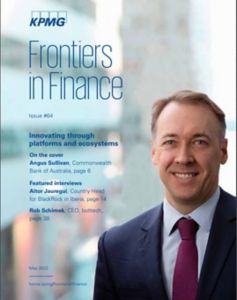Many traditional financial services products are being commoditized. They are becoming irrelevant in the lives of customers. They are seen as table stakes. What customers really care about is value, convenience, and security. And what they want is a financial services ecosystem uniquely tailored to their specific needs.
I am not particularly prone to making predictions. But — of this — I am fairly certain: in the next 15 years, all of the most successful financial services organizations will be platform players. The leaders will be defined by the ecosystems that gravitate around them. They will be measured by the incremental value they deliver their customers. And they will grow based on their ability to meet their customers’ needs.
Its a foregone conclusion
In part, my confidence comes from watching customer trends. Today’s financial services customers are looking for experiences and value. Traditional interactions with financial services firms are no longer engaging. People are looking for personalization, tailored offerings and value-added services. They want AI and technology to look after the more mundane stuff. My read of the future also comes from my view of the evolving market landscape. For the past decade, we have seen fintechs disaggregate financial services — carefully unpicking pain points within the financial services system and solving them. But now the pendulum has swung back. Customers don’t want to be dealing with multiple apps and interfaces.They want it all in one place. Demand for reaggregation is rising.
The third big sign that platforms are the future is the continuous drive among financial services firms for efficiency, agility and profitability. They recognize that the disaggregation of the past decade has created a massive ecosystem of niche players with valuable capabilities in key peripheral activities. Executives are increasingly asking themselves why they are expending resources on customer acquisition, or on antimony laundering (AML) and know your- customer (KYC), for example, when there are fintech players that can do it faster, more efficiently and more effectively.
A financial services future dominated by platform players is, therefore, somewhat of a foregone conclusion. Platform players will likely be more customer-centric, more value-driven, more personalized, and offer a broader set of services. They can use their ecosystems and their customer data to build impenetrable moats around their customers. They can operate more efficiently, with more agility and more profitability. They are more likely to remain relevant while others fade into obsolescence.
The leaders are already emerging
Fifteen years may seem like a short amount of time to achieve this type of transformational change across an entire industry (particularly one as regulated and as globally integrated as financial services). Yet I suspect my prediction may not be aggressive enough. In reality, the die will be cast within the next decade; just like AirBnB in accommodation, a handful of clearly dominant players will have emerged.
In other words, time is of the essence. The great power of platforms and ecosystems stems from their network effects. The more users, the more services, the more providers and the more data, the more valuable the network becomes.
It also becomes much ‘stickier’. The deeper a platform becomes embedded into a user’s life, the greater the barriers to switching. You are less likely to change mortgage providers, for example, if the lender is also providing you with your wealth management, payments, and insurance products through a single login (and then using that data to bring you better offers on everything else you need).
Urgency is also being driven by overwhelming customer demand. Prior to the pandemic, fintech offerings were mostly geared towards somewhat younger, more technologically-savvy and less risk averse customer segments. Now, customers of all types have become more digital, more experience-focused and more open to new approaches. They expect their financial interactions to be more innovative, more valuable and more experiential.
The big risk, in some respects, is that financial services companies may start to ‘lose themselves’ in the platform environment. Some may spread themselves into adjacent industry areas too hastily or not core to the customers they service.
Don’t lose the plot
As financial services organizations reorient themselves at the center of new platforms, many will find they are facing a host of new challenges. As some of the profiles in this publication make clear, choosing the right ecosystem and platform partners, at the right time, and aligned to the needs of your customers, is key. So, too, is creating the right experience and the right products and services.
Others may struggle to maintain the closeness of their client relationships in a platform environment. I’ve spoken with leaders who are understandably concerned they might be ceding some control over their capabilities and risks by working so closely with third parties.
In my view, this all comes back to building from your core strengths and knowing your customers. It starts with understanding the value you bring to your customers and then building on that to incrementally (yet rapidly) grow the relationship. From there, financial services organizations will likely have the data and the customer insights to know how to predict their customers’ needs and then respond to them.
Pulling off a pivot
I believe those financial services firms that fail to create and execute on a platform strategy today may rapidly become irrelevant to their customers in the near future. I also think they will find it increasingly difficult to deliver competitive offerings or value in an environment dominated by more flexible and innovative platform financial services providers. Without platform capabilities, it will likely be harder for firms to compete and even harder for them to keep customers.
In this edition of Frontiers in Finance, our professionals explore some of the challenges and opportunities facing financial services firms as they strive to pivot towards platforms. I hope their stories serve to inspire and catalyze financial services leaders to move boldly towards their platform strategy.
Connect with us
- Find office locations kpmg.findOfficeLocations
- kpmg.emailUs
- Social media @ KPMG kpmg.socialMedia
Explore more chapters







